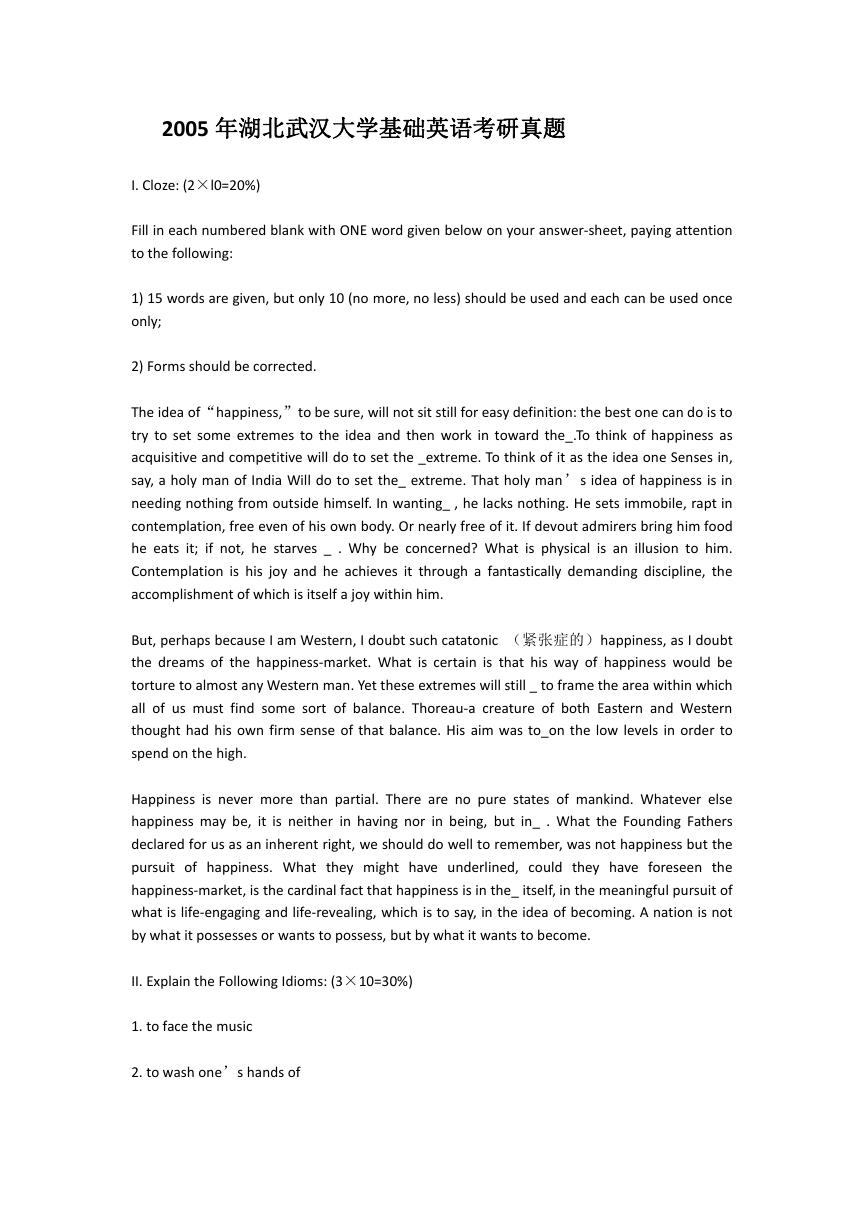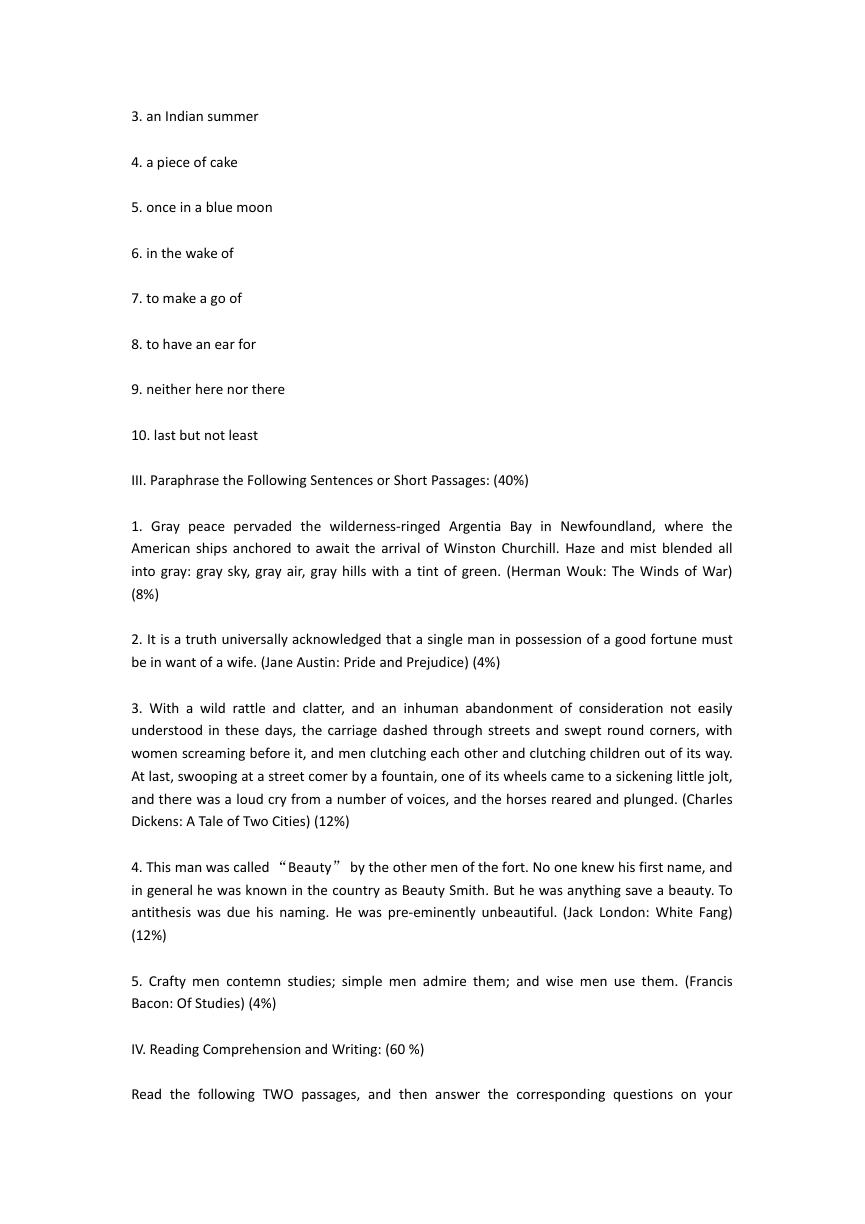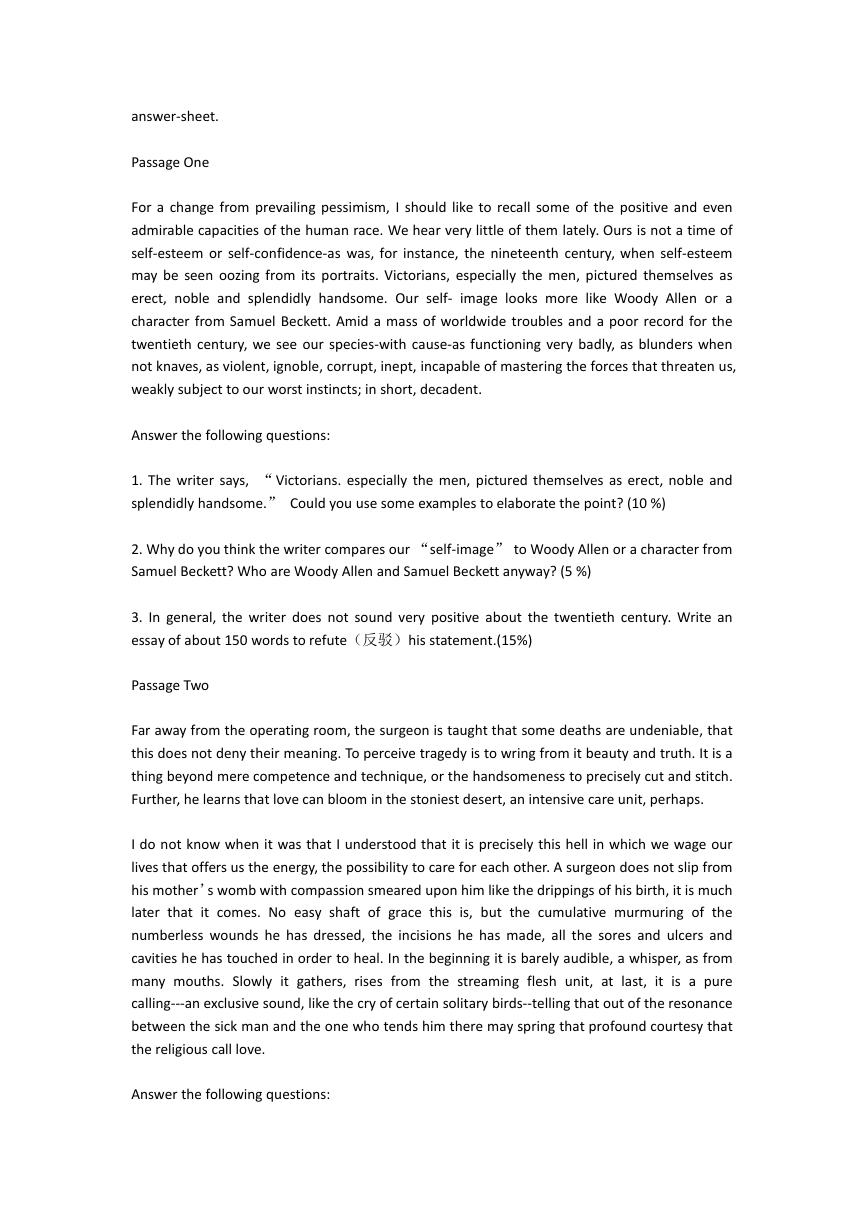2005 年湖北武汉大学基础英语考研真题
I. Cloze: (2×l0=20%)
Fill in each numbered blank with ONE word given below on your answer-sheet, paying attention
to the following:
1) 15 words are given, but only 10 (no more, no less) should be used and each can be used once
only;
2) Forms should be corrected.
The idea of“happiness,”to be sure, will not sit still for easy definition: the best one can do is to
try to set some extremes to the idea and then work in toward the_.To think of happiness as
acquisitive and competitive will do to set the _extreme. To think of it as the idea one Senses in,
say, a holy man of India Will do to set the_ extreme. That holy man’s idea of happiness is in
needing nothing from outside himself. In wanting_ , he lacks nothing. He sets immobile, rapt in
contemplation, free even of his own body. Or nearly free of it. If devout admirers bring him food
he eats it; if not, he starves _ . Why be concerned? What is physical is an illusion to him.
Contemplation is his joy and he achieves it through a fantastically demanding discipline, the
accomplishment of which is itself a joy within him.
But, perhaps because I am Western, I doubt such catatonic (紧张症的)happiness, as I doubt
the dreams of the happiness-market. What is certain is that his way of happiness would be
torture to almost any Western man. Yet these extremes will still _ to frame the area within which
all of us must find some sort of balance. Thoreau-a creature of both Eastern and Western
thought had his own firm sense of that balance. His aim was to_on the low levels in order to
spend on the high.
Happiness is never more than partial. There are no pure states of mankind. Whatever else
happiness may be, it is neither in having nor in being, but in_ . What the Founding Fathers
declared for us as an inherent right, we should do well to remember, was not happiness but the
pursuit of happiness. What they might have underlined, could they have foreseen the
happiness-market, is the cardinal fact that happiness is in the_ itself, in the meaningful pursuit of
what is life-engaging and life-revealing, which is to say, in the idea of becoming. A nation is not
by what it possesses or wants to possess, but by what it wants to become.
II. Explain the Following Idioms: (3×10=30%)
1. to face the music
2. to wash one’s hands of
�
3. an Indian summer
4. a piece of cake
5. once in a blue moon
6. in the wake of
7. to make a go of
8. to have an ear for
9. neither here nor there
10. last but not least
III. Paraphrase the Following Sentences or Short Passages: (40%)
1. Gray peace pervaded the wilderness-ringed Argentia Bay in Newfoundland, where the
American ships anchored to await the arrival of Winston Churchill. Haze and mist blended all
into gray: gray sky, gray air, gray hills with a tint of green. (Herman Wouk: The Winds of War)
(8%)
2. It is a truth universally acknowledged that a single man in possession of a good fortune must
be in want of a wife. (Jane Austin: Pride and Prejudice) (4%)
3. With a wild rattle and clatter, and an inhuman abandonment of consideration not easily
understood in these days, the carriage dashed through streets and swept round corners, with
women screaming before it, and men clutching each other and clutching children out of its way.
At last, swooping at a street comer by a fountain, one of its wheels came to a sickening little jolt,
and there was a loud cry from a number of voices, and the horses reared and plunged. (Charles
Dickens: A Tale of Two Cities) (12%)
4. This man was called “Beauty” by the other men of the fort. No one knew his first name, and
in general he was known in the country as Beauty Smith. But he was anything save a beauty. To
antithesis was due his naming. He was pre-eminently unbeautiful. (Jack London: White Fang)
(12%)
5. Crafty men contemn studies; simple men admire them; and wise men use them. (Francis
Bacon: Of Studies) (4%)
IV. Reading Comprehension and Writing: (60 %)
Read the following TWO passages, and then answer the corresponding questions on your
�
answer-sheet.
Passage One
For a change from prevailing pessimism, I should like to recall some of the positive and even
admirable capacities of the human race. We hear very little of them lately. Ours is not a time of
self-esteem or self-confidence-as was, for instance, the nineteenth century, when self-esteem
may be seen oozing from its portraits. Victorians, especially the men, pictured themselves as
erect, noble and splendidly handsome. Our self- image looks more like Woody Allen or a
character from Samuel Beckett. Amid a mass of worldwide troubles and a poor record for the
twentieth century, we see our species-with cause-as functioning very badly, as blunders when
not knaves, as violent, ignoble, corrupt, inept, incapable of mastering the forces that threaten us,
weakly subject to our worst instincts; in short, decadent.
Answer the following questions:
1. The writer says, “Victorians. especially the men, pictured themselves as erect, noble and
splendidly handsome.” Could you use some examples to elaborate the point? (10 %)
2. Why do you think the writer compares our “self-image” to Woody Allen or a character from
Samuel Beckett? Who are Woody Allen and Samuel Beckett anyway? (5 %)
3. In general, the writer does not sound very positive about the twentieth century. Write an
essay of about 150 words to refute(反驳)his statement.(15%)
Passage Two
Far away from the operating room, the surgeon is taught that some deaths are undeniable, that
this does not deny their meaning. To perceive tragedy is to wring from it beauty and truth. It is a
thing beyond mere competence and technique, or the handsomeness to precisely cut and stitch.
Further, he learns that love can bloom in the stoniest desert, an intensive care unit, perhaps.
I do not know when it was that I understood that it is precisely this hell in which we wage our
lives that offers us the energy, the possibility to care for each other. A surgeon does not slip from
his mother’s womb with compassion smeared upon him like the drippings of his birth, it is much
later that it comes. No easy shaft of grace this is, but the cumulative murmuring of the
numberless wounds he has dressed, the incisions he has made, all the sores and ulcers and
cavities he has touched in order to heal. In the beginning it is barely audible, a whisper, as from
many mouths. Slowly it gathers, rises from the streaming flesh unit, at last,
it is a pure
calling---an exclusive sound, like the cry of certain solitary birds--telling that out of the resonance
between the sick man and the one who tends him there may spring that profound courtesy that
the religious call love.
Answer the following questions:
�
1. Please cite at least THREE figures of speech used in the passage. Be sure to identify the figures
of speech you might have cited and then explain briefly how each of them is used in its own
particular context. (10 %)
2. Write an essay of 150 words as a response to the following, in relation to the context where it
comes. (20 %)
“To perceive tragedy is to wring from it beauty and truth. It is a thing beyond mere competence
and technique, or the handsomeness to precisely cut and stitch. Further, he learns that love can
bloom in the stoniest desert, an intensive care unit, perhaps.”
�








 2023年江西萍乡中考道德与法治真题及答案.doc
2023年江西萍乡中考道德与法治真题及答案.doc 2012年重庆南川中考生物真题及答案.doc
2012年重庆南川中考生物真题及答案.doc 2013年江西师范大学地理学综合及文艺理论基础考研真题.doc
2013年江西师范大学地理学综合及文艺理论基础考研真题.doc 2020年四川甘孜小升初语文真题及答案I卷.doc
2020年四川甘孜小升初语文真题及答案I卷.doc 2020年注册岩土工程师专业基础考试真题及答案.doc
2020年注册岩土工程师专业基础考试真题及答案.doc 2023-2024学年福建省厦门市九年级上学期数学月考试题及答案.doc
2023-2024学年福建省厦门市九年级上学期数学月考试题及答案.doc 2021-2022学年辽宁省沈阳市大东区九年级上学期语文期末试题及答案.doc
2021-2022学年辽宁省沈阳市大东区九年级上学期语文期末试题及答案.doc 2022-2023学年北京东城区初三第一学期物理期末试卷及答案.doc
2022-2023学年北京东城区初三第一学期物理期末试卷及答案.doc 2018上半年江西教师资格初中地理学科知识与教学能力真题及答案.doc
2018上半年江西教师资格初中地理学科知识与教学能力真题及答案.doc 2012年河北国家公务员申论考试真题及答案-省级.doc
2012年河北国家公务员申论考试真题及答案-省级.doc 2020-2021学年江苏省扬州市江都区邵樊片九年级上学期数学第一次质量检测试题及答案.doc
2020-2021学年江苏省扬州市江都区邵樊片九年级上学期数学第一次质量检测试题及答案.doc 2022下半年黑龙江教师资格证中学综合素质真题及答案.doc
2022下半年黑龙江教师资格证中学综合素质真题及答案.doc